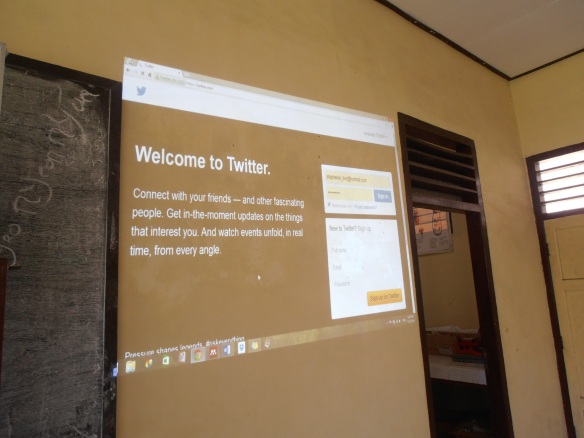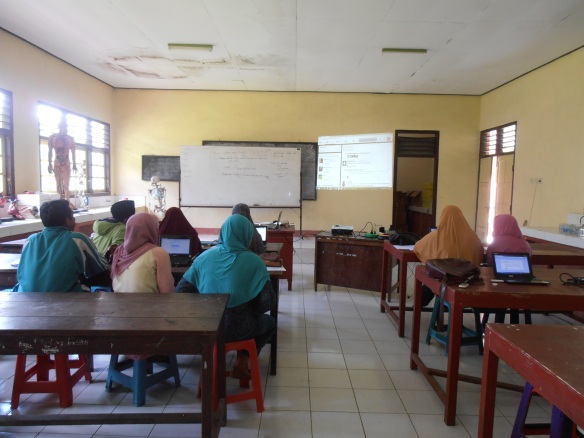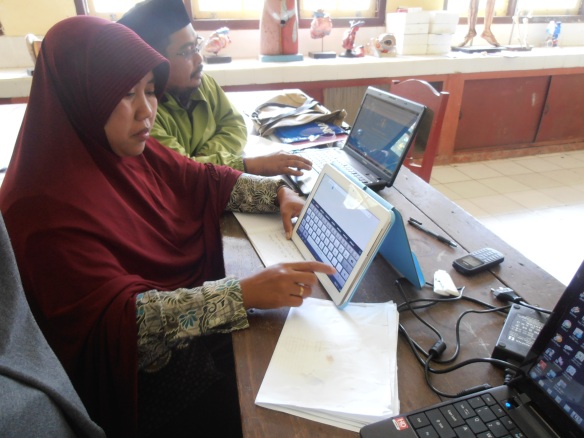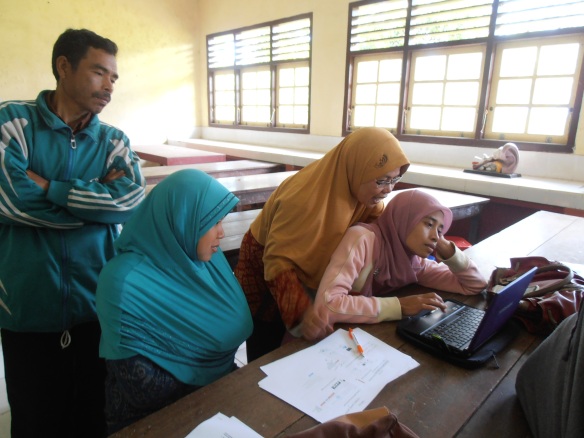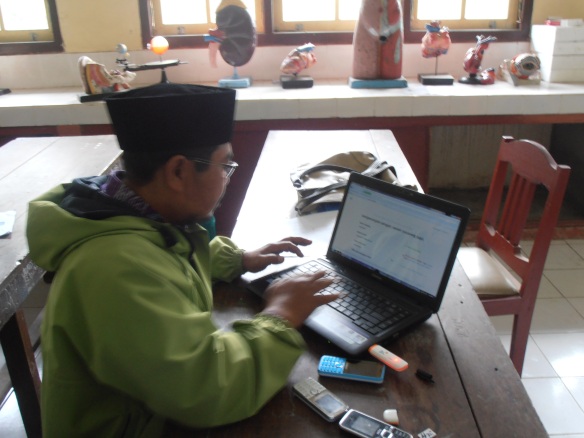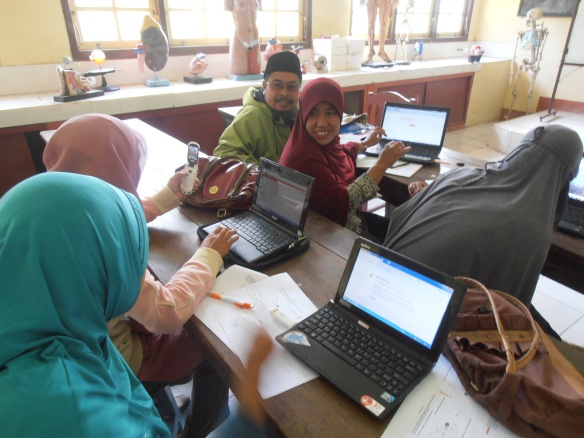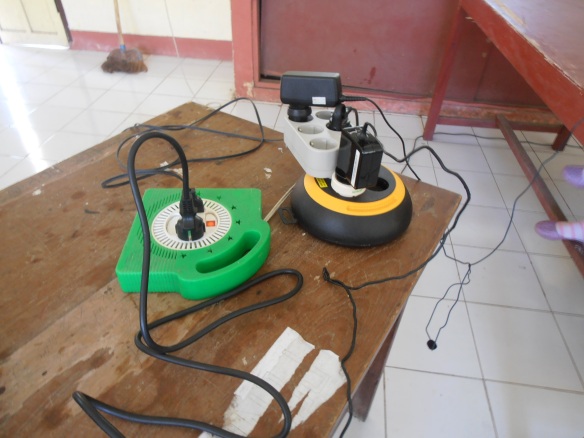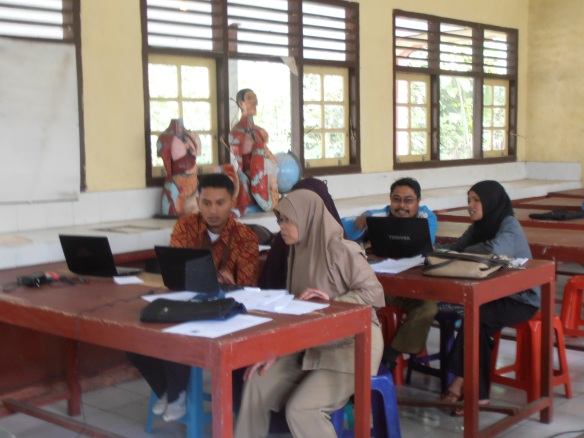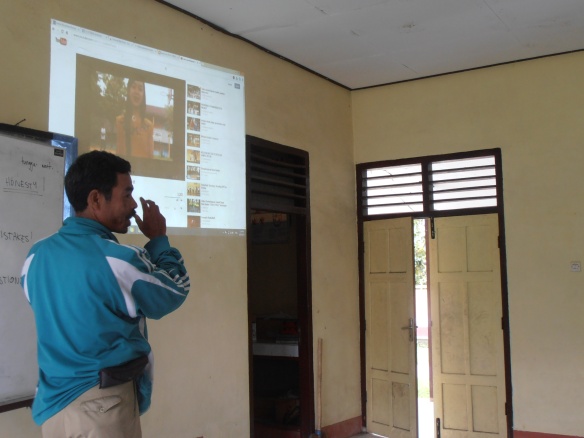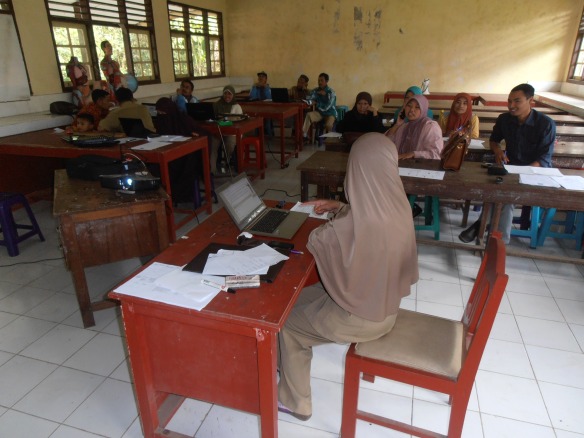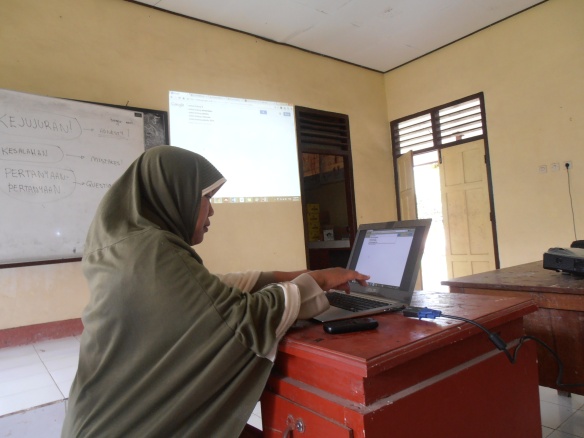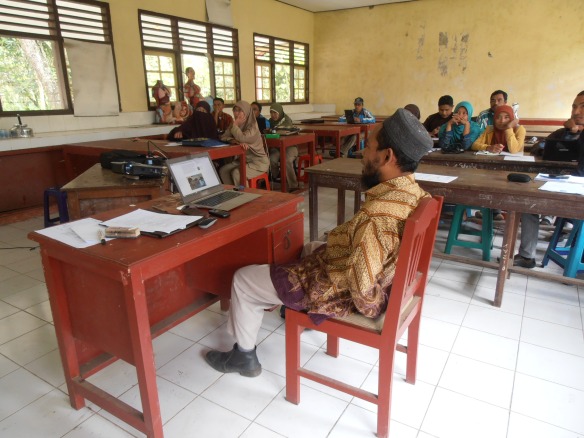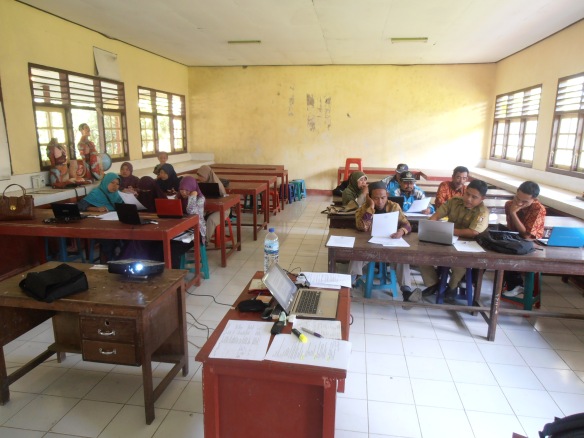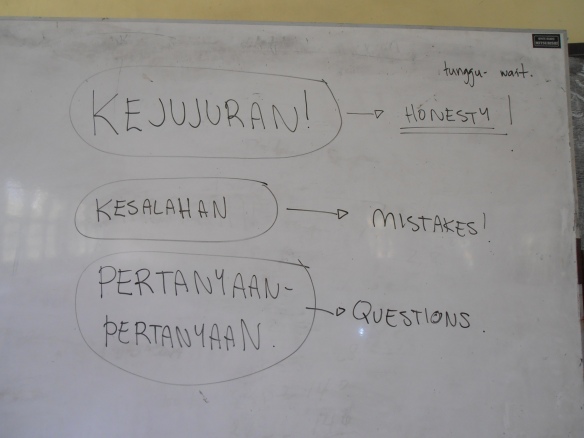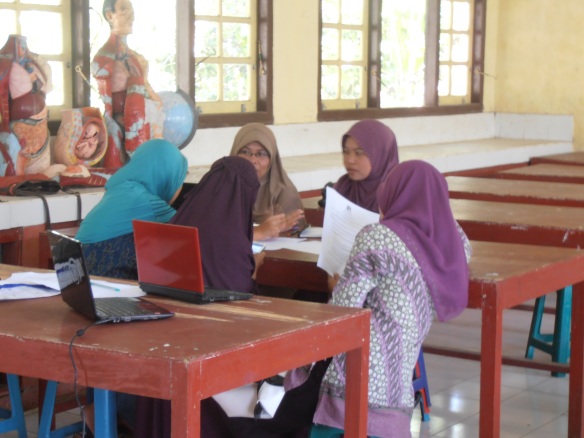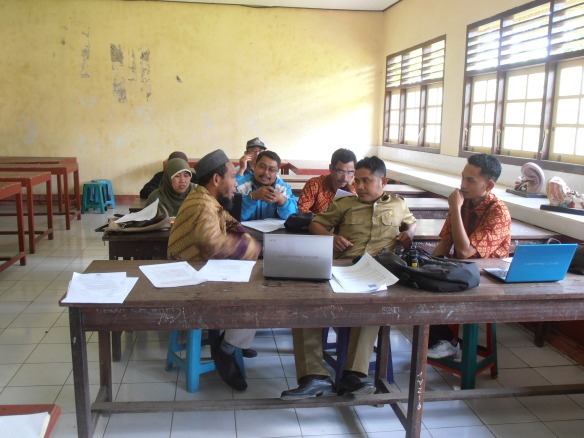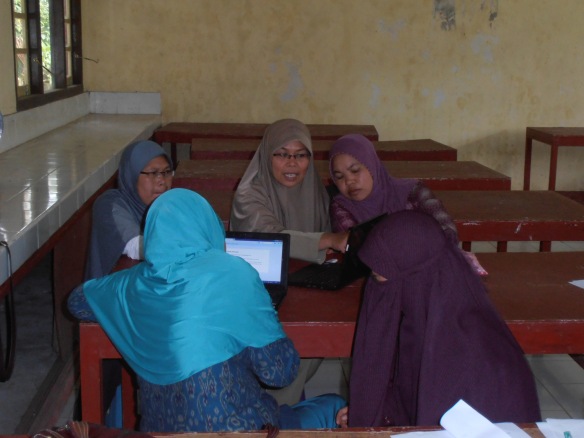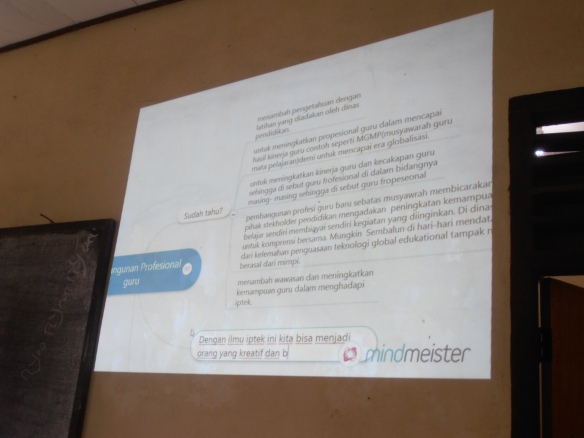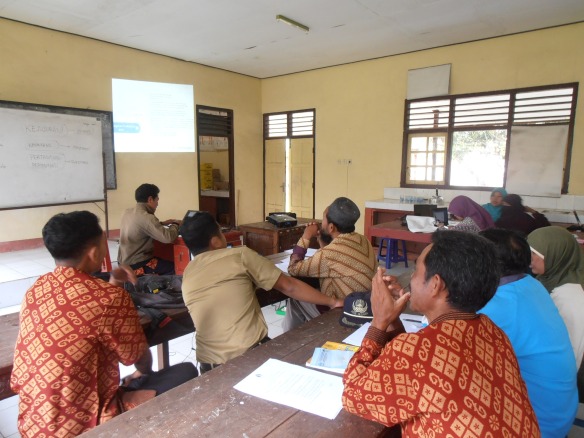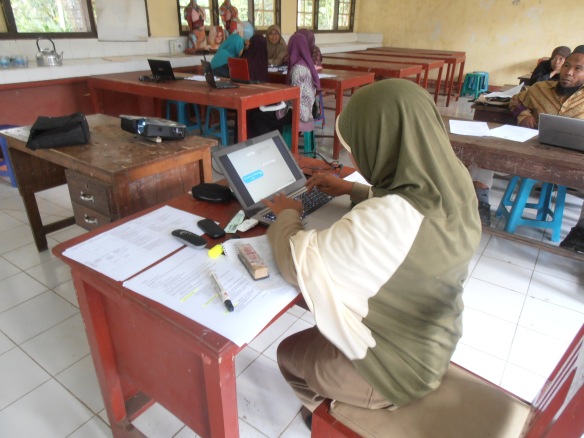Day 5 – Mixing everything together
Finally had a chance to sit down and finish my post on the last day of ICT workshops!
Saturday was sadly the last day. Would have loved to run this workshop for three months, not one week, but unfortunately that’s all the time I had to work with because of my University timetable.
Saturday’s workshop was originally intended to start with a reflective activity on what we had learned about ICT and teacher professional development, however a number of teachers had finally been able to buy Telkomsel internet sim cards (the fastest internet provider in the village) and were eager to set up their own Twitter and Blogging accounts after days of being unable to. Once again, Suhartati Damsi took it upon herself to ensure all teachers understood how to use Twitter, Blogger, Email and Facebook. Suhartati helped everyone with everything from logging in, making new accounts from scratch, retrieving lost passwords and even simple internet connectivity problems. She hadn’t even properly made her own Twitter or Blogging accounts yet, and was running around helping everyone else! So humbling.
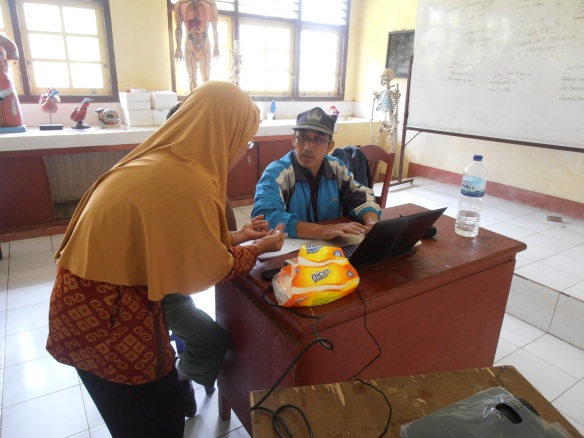
There was other good news as well – two of the teachers who previously hadn’t been able to access the internet were finally able to and were very excited to set up Twitter, Blogging and Email accounts! Here are some photos of them doing this:
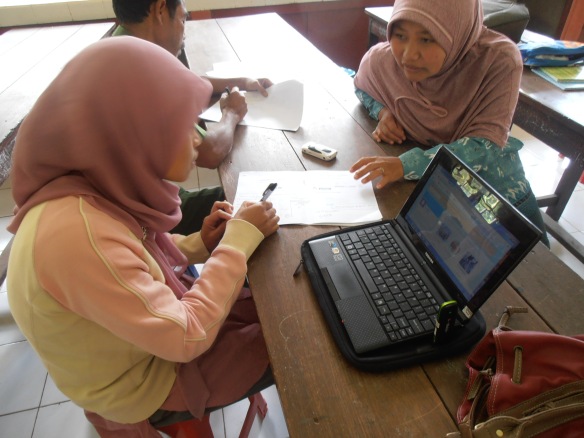
Len had been trying for two days to log into Twitter, and was finally able to make a Blogger and Twitter account! Very exciting!
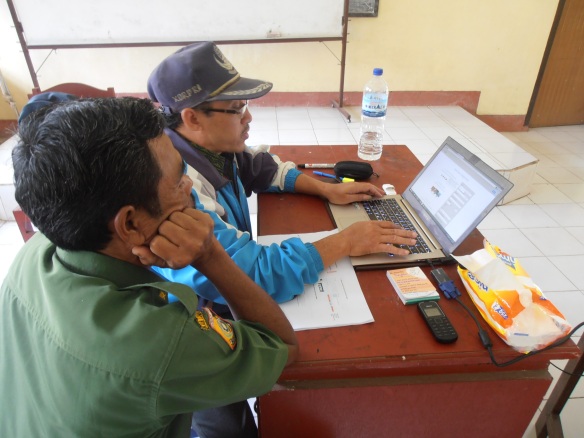
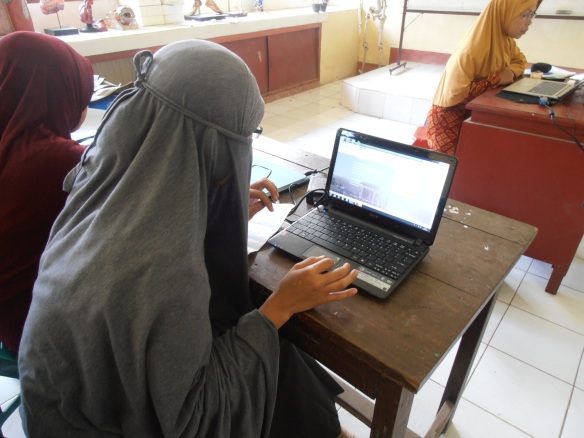
Huriani, still trying to access Twitter after three hours of internet not working properly on her computer!
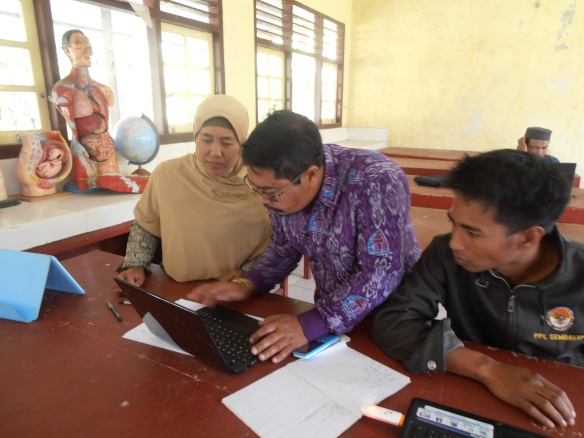
Again, all teachers naturally worked in teams and collectively worked through problems.
I also ran through with the teachers the importance of using Google to search for help on how to use any of the ICT tools we’d covered during workshops. I explained to them that I would be available to contact at any time for further help while in Melbourne, but that it is also important they develop a habit of searching for solutions themselves. This is because most of the teachers are now accessing Twitter and Facebook from their homes to practice what they’ve learned in workshops,which means they don’t necessarily always have other teachers there to help collectively problem-solve as was the case in our workshops.
We then launched into the reflective activity, where we completed the ‘L’ section (‘what we have learned’) of the Mind Meister Map which we began filling in on the first day of our workshop (see post for day 1 of our workshop)). It was great to re-cap and reflect, and also really important for me to understand which ICT tools resonated the most with teachers. Some of the reflections were:
– We now know the difference between Twitter, Blogging and Emailing.
– Twitter is fantastic because we can seek help or assistance
– We need more resources to facilitate ongoing use of ICT
– I’m very interested in the use of email! I’m going to teach my students how to use email too and show them how they can send their classroom tasks to me through their emails accounts. I’m also going to use my email to send information to my friends in Jakarta and Australia! And I can also use Twitter and Facebook for business reasons too, for example, my coffee and hand weaving material business.
– I want to learn how to use Skype now I can speak to people through video
– We can use videos in classes now to motivate our students and make them more interested in our subject content. For example, we can use videos to help simplify subjects that students find difficult
– We can use our Twitter accounts to communicate to other teachers that now we have blogs and Facebook accounts
– Through the use of ICT we can become a better source of knowledge within the classroom
– The most important thing is how to make connections with other teachers through the internet
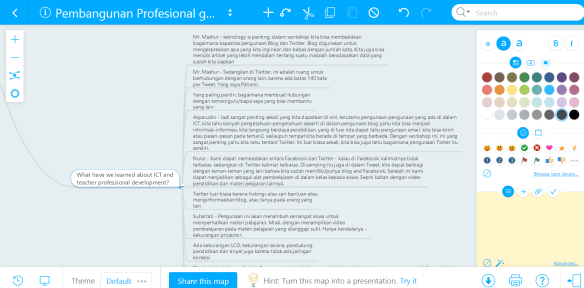
Our Mind Meister Map used for our KWL activity (K = what teachers know, W = what teachers want to know, L = what teachers have learned). We completed the ‘L’ section
After this reflective activity, I invited Suhartati Damsi and Nurul Fatmah to facilitate a group workshop where teachers revised over Facebook, Twitter, Blogging, Email etc., while I completed teacher interviews at the back of the classroom for my thesis. It was fantastic – I was able to sit at the back of the classroom while the teachers acted as each other’s coaches.
My interviews were semi-structured and very open-ended, avoiding the use of any questions or statements which may infer a desired answer, e.g. ‘We know ICT tools will be effective for ….. how will you use it?”. All questions were presented in a neutral manner, some of which were:
– What is your broad perspective on the use of ICT for your own professional development?
– What are some of the strengths and weaknesses of teacher professional development at your school?
– What are any positive or negative impacts for your students or teachers which you think may arise as a result of increased ICT use?
– Are there any tools we’ve covered in our workshops that you could imagine yourself using in the future?
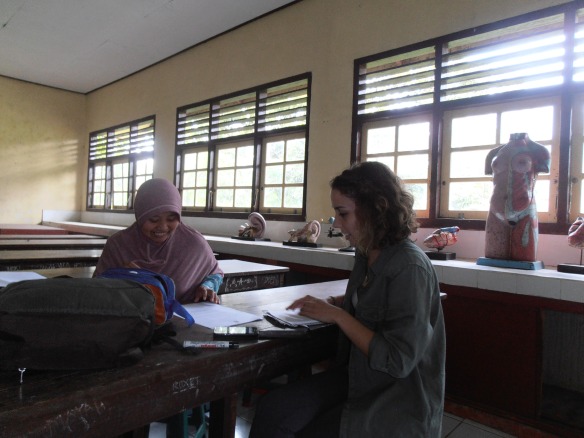
Myself conducting one of the interview
I found the interviews really insightful, particularly in regards to the concerns teachers spoke of in regards to long-term ICT use for their own professional development and in general at their school. Some of the most common perspectives were:
– Teachers were concerned the internet might begin to waste too much time as there is so much new information to explore (a very common problem I think!)
– Teachers were concerned students may get access to inappropriate material through the internet
– Social networking sites might become counter-productive and end up being too distracting for professional use
– Many students are obsessed with Facebook and their school work suffers as a result at home (very universal problem!)
– The teachers need more training – one week wasn’t enough to learn everything and practice everything as well (multiple teachers pointed this out)
There were other very other interesting responses which I’ll detail properly in another post later (I have gained teachers’ permission to refer anonymously to their perspectives that they expressed during workshops). We were able to complete most of the interviews, and I felt really strongly that all teachers had enough knowledge to continue discovering various ICT tools for themselves and continue building on what was covered in workshops.
Teachers are now contacting me on Twitter which I am thrilled about, and I am in the process of coaching them remotely online.
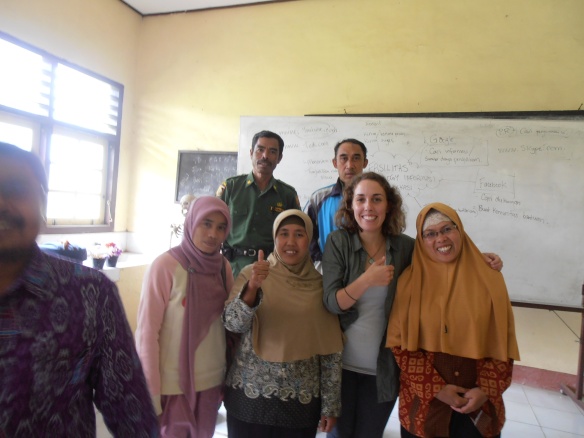
At the end of the last workshop!
Saying bye to the teachers was very difficult, and I was so disappointed I wasn’t able to continue workshops longer.
There were so many challenges with these workshops, and it has surely been the most difficult thing I have ever done. I am so thrilled to have had the opportunity though to have learned so much, and to create some fantastic networks that I hope I’ll be able to utilize later.
The (brilliant and motivating) Principal mentioned to me that when he posted a Facebook photo status about our workshops, over one hundred teachers commenting either with interest or asking if we can all collaborate and learn together in the future! So the Principal wants to run the workshop again next year with teachers from the surrounding schools to share the exciting world of ICT with more teachers to help enhance teaching and learning. We’ll see what happens, but for now, I’m really excited (albeit very intimidated) to articulate some of the huge lessons I’ve learned in my thesis, and to use my writing time as a process of some much-needed proper reflection.
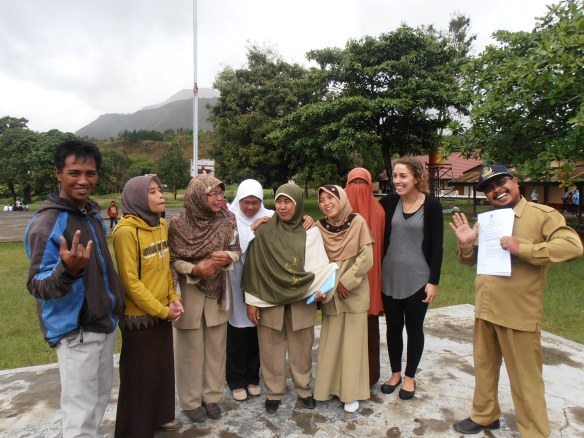
Saying goodbye to the teachers!










